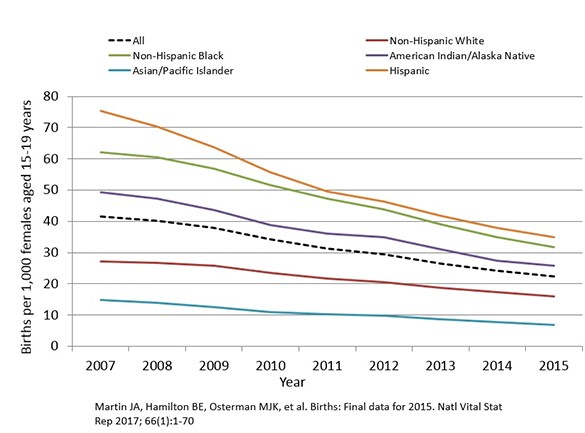By Dr. Rachel Watson, pediatric resident at CHOC Children’s
Pregnancy during the teenage years can be a significant source of social, economic and interpersonal stress for an adolescent and their family. Only 40 percent of teen mothers earn their high school diploma by age 22, as opposed to 90 percent of women who do not give birth during their teenage years. Less than 2 percent of teen mothers graduate from college by age 30.
In the U.S., teen pregnancy has been steadily declining over the past decade. Although the reasons are not entirely clear, it is thought that the largest contributors are increased access to sexual health information and increases of prescription written for and use of birth control have contributed to this decline. The U.S. has seen a decline in teen birth rates in all 50 states and among all racial and ethnic groups. However, each year more than 200,000 teens will give birth in this country.

Teen birth rates are higher in individuals who are living in poverty, living in a single-parent household, in foster care, and/or facing racial discrimination.
What can parents do to prevent teen pregnancy?
Have open, honest discussions with your teen about sex, sexuality, and healthy relationships.
- Be honest. Let your teen know that talking about sex isn’t easy, but that it is important that information about sex comes from you.
- Be available and keep all lines of communication open with your teen. They may not want to discuss these topics with you initially, but let them know that it’s important to have these discussions to avoid potentially harmful situations.
- Give your teen a chance to talk and ask questions.
- Leave behind judgement. Instead, be curious.
- Show your love and support.
- If you are having a difficult time with these conversations, consider asking a pediatrician/medical provider, trusted family member, or priest, minister or rabbi for help.
Start these conversations early
- Fifteen percent of 15-year-olds report sexual activity in the past.
- Lay the groundwork before the onset of puberty.
- Answer their questions truthfully at any age. This will build trust, starting in toddlerhood.
Schedule regular appointments with your teen’s medical provider.
- Doctors and nurses use this opportunity to discuss the advantages and disadvantages of different contraceptive methods, sexually transmitted infections, and what steps your teen can take to protect themselves.
- Know where your teen is and what they are doing, particularly after school.
- Know your teen’s friends.
- Be aware of your teen’s use of social media
What can educators to do prevent teen pregnancy?
- Discuss normal sexual development and sexuality.
- Earlier implementation of comprehensive sexual education in schools.
- 8 in 10 teens did not receive sexual education before their first sexual encounter. Include conversations on how LGBTQ youth can have safe relationships as most sexual education focuses on heterosexual relationships. Your medical provider can help with this, too.
- Talk about how to use condoms correctly and stress the importance of using a condom every time to prevent sexually transmitted diseases
Visit these resources for additional information, or speak to your child’s primary care physician:





